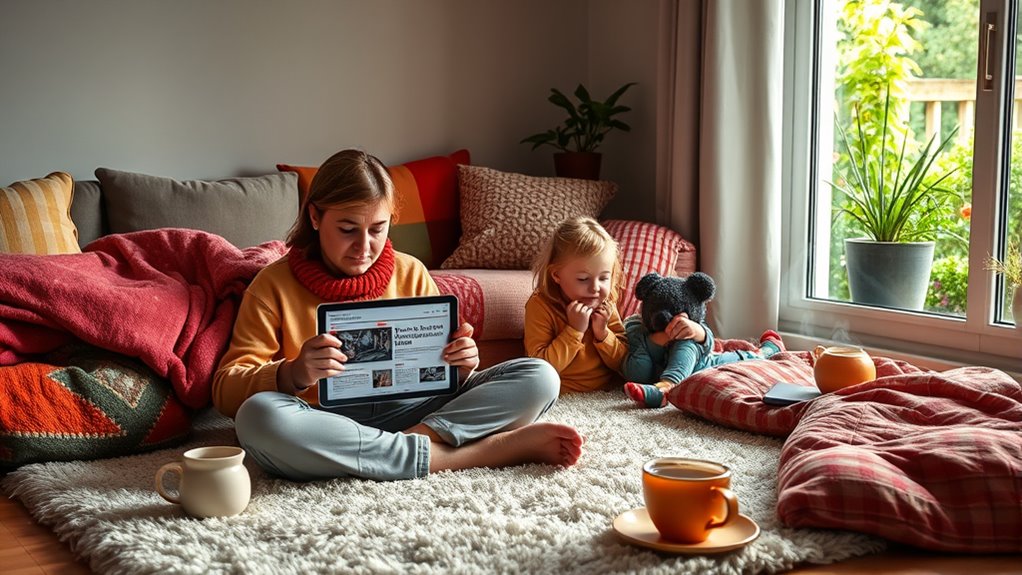To handle news anxiety around kids, stay calm and provide age-appropriate explanations to help them understand what’s happening. Model a composed attitude, validating their feelings and encouraging questions. Limit media exposure and focus on routines and positive activities, like outdoor time. Teach them to assess news sources critically and remind them that most situations don’t require all details. If you keep going, you’ll discover more strategies to support your child’s emotional resilience.
Key Takeaways
- Model calmness and provide age-appropriate explanations to help children understand news without fear.
- Limit children’s exposure to distressing news and encourage breaks for relaxation and positive activities.
- Validate children’s feelings, listen openly, and reassure them that most people are safe.
- Teach media literacy by discussing credible sources and critical thinking about sensational headlines.
- Create a safe space for open conversations and reinforce routines to foster stability and emotional resilience.

In today’s world, news about global crises and local conflicts can easily cause anxiety, especially when kids are nearby. As a parent or caregiver, you might notice your children becoming more anxious or upset after hearing about distressing events. To help them navigate these feelings, it’s essential to focus on children’s coping strategies and foster media literacy. Children often look to adults for cues on how to interpret the world around them. If they sense that you’re overwhelmed or unsure, they may feel even more anxious. Conversely, modeling calmness and providing clear, age-appropriate explanations can help build their resilience. Teaching kids media literacy—how to critically evaluate news sources—empowers them to understand that not everything they see or hear is an immediate threat or reality. Explain that some news is sensationalized or biased, and encourage them to ask questions about what they’re viewing. This helps children develop a more balanced perspective and reduces fear stemming from misinformation or overly dramatic headlines.
Creating a safe space for open conversations is vital. Let your children express their feelings without judgment, validating their concerns while gently guiding them towards understanding. For younger kids, simple reassurance like “Most people are safe” or “There are many good things happening, too” can ease worries. For older children, discuss the importance of staying informed but also setting boundaries on media consumption. Encourage them to take breaks from distressing news and focus on positive activities or hobbies. Establishing routines that include time for play, relaxation, and family connection can help restore a sense of stability and control. When children see that they’re supported and that their feelings are normal, they’re better equipped to cope with news anxiety.
Additionally, limiting exposure to distressing news can prevent overwhelming your child’s emotional reserves. Use media literacy as a tool to help them process what they see and hear, rather than avoiding the news altogether. Teach them how to identify credible sources and remind them that they don’t need to know every detail to stay safe. The goal is to foster a balanced approach—being informed without becoming overwhelmed. As a parent, your proactive steps in managing your own media consumption and emotional responses will set a powerful example. By promoting healthy coping mechanisms and media literacy, you can help your children develop the resilience they need to handle unsettling news and foster a sense of security amid ongoing global challenges. Additionally, understanding the beach body concept and how to safely enjoy outdoor activities can serve as a positive distraction and promote physical and mental well-being during stressful times.
Frequently Asked Questions
How Do I Explain Complex News Events to Young Children?
You should use age-appropriate language and honest reassurance when explaining complex news events to young children. Keep your explanations simple, focusing on what they need to know to feel safe. Avoid overwhelming details, and encourage questions to clarify their concerns. Reassure them with calm, honest responses, emphasizing that they are safe and loved. This approach helps reduce confusion and anxiety while fostering trust and understanding.
What Signs Indicate My Child Is Overwhelmed by News?
Kids as young as 8 show increased anxiety from media exposure, highlighting the importance of monitoring their reactions. Signs they’re overwhelmed include withdrawal, irritability, difficulty sleeping, or physical complaints like headaches. You can help by teaching media literacy and encouraging emotional regulation techniques. Watch for these cues, and if they persist, consider limiting news exposure and providing reassurance to help your child process their feelings safely.
Are There Specific Topics I Should Avoid Discussing With Kids?
You should avoid discussing topics that aren’t age-appropriate or could be too upsetting for your child. Focus on age-appropriate conversations, and set clear media boundaries to protect them from distressing content. Keep discussions gentle and positive, and steer clear of graphic or complex issues that may overwhelm your child’s understanding. By doing this, you help create a safe environment where they can process news without unnecessary anxiety.
How Can I Support My Child’s Emotional Resilience?
You can support your child’s emotional resilience by teaching them coping strategies and fostering emotional intelligence. For example, if they feel overwhelmed by news, guide them to express their feelings and practice deep breathing. Encourage open conversations about emotions, helping them identify and understand their feelings. This approach strengthens their ability to manage stress, builds resilience, and equips them with skills to handle future challenges confidently.
When Should I Seek Professional Help for My Child’s Anxiety?
You should seek a professional assessment if your child’s anxiety persists, worsens, or starts interfering with daily activities. If their emotional support needs aren’t being met at home or they show signs of severe distress, it’s time to consult a mental health expert. Professional help can provide tailored strategies and emotional support, helping your child manage anxiety more effectively and ensuring they feel safe and supported.
Conclusion
Remember, managing your news anxiety isn’t just for your peace—it’s for your kids’ well-being too. By staying informed and balanced, you set a healthy example for them. Did you know that over 60% of parents report feeling anxious about their children’s exposure to news? Keeping this in mind, take deliberate breaks and focus on positive stories. Your calm and mindful approach creates a safer space for your kids to grow and learn.









